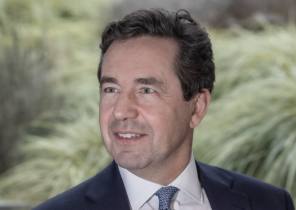

John Blackman is perhaps a rarity in financial services, in that he has stayed with the same company, JHC, his whole working life, since graduating in the 1980s to now running the business as chief executive.
But that is probably because his business is a software company that he helped to found with business partner, John Hemming; he has a 10 per cent stake in the business and has seen it evolve from providing accounting packages for solicitors to offering software for platforms, settlement and transaction packages for wealth managers and more recently, technology for investment advisers.
The company started in 1985, with Mr Blackman joining after graduating in computer science at Imperial College; he started by writing the software, until 15 years ago, he "started organising". Mr Hemming has subsequently taken a back seat to the business.
They got a break into financial services when in the late 1980s, wealth managers were required to hold their client money in a separate client account. Mr Blackman said: "That's quite a complicated thing to do and that gave us the opportunity to get into wealth management.
"Even now, after all these years, our system has this link between transactions and cash management. Our clients' compliance is now very straightforward."
One of the company's earliest clients was Charles Stanley, for whom they do back office, settlement and reconciliation and trading software. They now look after other wealth managers, as well as platforms and financial advisers, through their system Figaro, and now Neon. Altogether they look after 60 financial institutions, administering about £150bn in assets.
Mr Blackman said "Five years ago, the discretionary wealth management strand, the Isa strand and financial advisers' strand, they spoke a different language. What's happened is they're all starting to come together post-RDR.
"It's changed things enormously. Their income stream changed enormously as clients have to pay up front, and partly because of that the product structures have changed completely with the introduction of ETFs."
With the pressure on costs from clients, the platforms and wealth managers have had to adapt, and needed new software to offer new, low-cost products requested by the clients.
But JHC does not just offer software for the big firms; it has developed a package that allows financial advisers to cater for the demands of Mifid II, which is stating that advisers have to do regular checks on their clients to ensure they are in the right product.
Typically this is something advisers do anyway on a more or less regular basis; MiFID II formalises this and says advisers have to check their clients' portfolio once every three months.
Mr Blackman said: "As an adviser, you would need to do a quarterly review of the portfolio, and maybe make some suggestions, and be certain you've got the right product.
"Going forward, you've got to do that on a more regular basis. With MiFID II, it's checking that the frequency of the investments you've made are still in line with the suitability profile.
"You might have a client who's quite averse to risk and you might have bought them a fund, and during the course of that month, the managers bought something that's not appropriate, and you have to take a decision or in consultation with your client, you have to rebalance your portfolio."
JHC has developed software called Neon that advisers can upload and use to determine as often as they like the situation of their clients, and whether they are being compliant.
Mr Blackman said: "The advisers have to be regulated to CF30. What our software allows them to do is get them a dashboard to enable them to be compliant with CF30."
JHC also provides software to platforms, with one client being AJ Bell. Here he is seeing change too.
Mr Blackman said: "Post-RDR, because everything is more transparent, as a consumer you're more likely to demand an ETF and post the Brexit vote, bonds are becoming more attractive, so you want a platform that allows you to invest in both.
"You can buy a multi-asset fund, or you can open an account that gives you access to the underlying assets. If you wanted to invest in a bond, you could just buy the bond. Our systems allow our clients to offer these solutions to the end customer, or direct access to the underlying assets. "
Melanie Tringham is features editor of Financial Adviser
Career highlights
1986 Joined JHC as software developer
2000 Took over as chief executive
Degree in Computing Science from Imperial College



